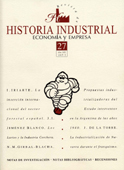Cotton, textile packagin and home-weaving. Industrializing proposal of the interventionist state in Argentina during the 1940s
Keywords:
Argentina, Cotton, Interventionism, WeavingAbstract
The aim of this paper is to analyze the characteristics of the industrialization project in Argentina in the years that preceded Peron´s regime. It intends to disclose its range, its aims and the results achieved by such projetc, as an expression of the relationship between the prevailing economy of the Pampas and the non-competitive agrarian production, specific of the marginal regions. In that direction, the home-weaving, in connection with the packaging for rural products becomes an interesting case study. The purpose is to advance in the characterization of the changes and continuities of the rural Argentina through the knowledge of the agrarian and agroindustrial policy implemented by the interventionist government during the 1930s and 1940s. Therefore, widen to the interpretations concerning the relationship between government and agro-industrial bourgeoisie.Downloads
Downloads
Published
How to Cite
Issue
Section
License
We have been applying a Creative Commons Attribution license (CC-BY) since 2019, before that year we had a partial open access policy, which included open access for the first two months after publication, followed by an embargo policy for non-subscribers, as access to the last 4 published issues was restricted to journal subscribers. In contrast, early-view articles were always open access prior to publication in an assigned volume. Until 2024 the access to the last 4 published numbers was restricted to those who were subscripted to the journal.
The author assigns all rights to the publisher. Creative Commons
The author who publishes in this journal agrees to the following terms:
- The author assigns all intellectual property rights exclusively to the publisher for the entire duration of the applicable intellectual property rights.
- The publisher will distribute the texts under the Creative Commons Attribution License, which allows others to share the work, provided that they acknowledge the authorship, its initial publication in this journal, and the conditions of the license.





